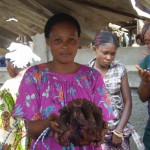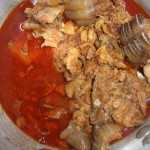Bushmeat: Beyond the Ecological Crisis
Español (pdf) Français (pdf) Deutsch (pdf)
(Vienna, 15 February 2010) – Contemporary African societies are a mix of modernized, western society and traditional African roots. Those traditions mean that people – rural and urban – still consume bushmeat for reasons linked to culture, taste and attachment to healthy, natural products.
However, the scale of hunting occurring in Central Africa poses a threat to many tropical forest species. The response to this has typically been legal: ban the trade in bushmeat and criminalize the hunters and consumers.
This, said Nathalie Van Vliet, Bushmeat strategic advisor for TRAFFIC, has not been terribly effective. The trade continues to flourish but in a hidden economy that makes it more difficult to manage or control.
Those in the bushmeat trade who make money out of the commercialisation of rare species for the urban markets need to be strictly controlled. However, those who eat bushmeat for their own nutrition or sell bushmeat to pay for medicines or school fees, should not be presented as criminals,” she says.
Dr. Van Vliet will coordinate a session dealing with the hunting of bushmeat in Central Africa at the 2010 IUFRO World Congress in Seoul.
She hopes her session will reach beyond conservationists to also integrate the input of social, health and economic stakeholders to help develop more integrated bushmeat strategies and policies.
- Photo taken by Casimir Nebesse (2009)
- Photo taken by Kisangani Casimir Nebesse (2009)
- Photo taken by Nathalie van Vliet (2009)
- Photo taken by Nathalie van Vliet (2008)
IUFRO Podcast – An interview with GFIS coordinator Eero Mikkola
This podcast is an introduction to the Global Forest Information Service (GFIS) by Eero Mikkola (project coordinator). He explains to us how GFIS works, what the future plans for development are and what is important for you to know!
Enjoy your listening!




